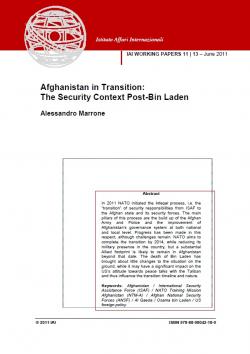Afghanistan in Transition: The Security Context Post-Bin Laden
In 2011 NATO initiated the Inteqal process, i.e. the “transition” of security responsibilities from ISAF to the Afghan state and its security forces. The main pillars of this process are the build up of the Afghan Army and Police and the improvement of Afghanistan’s governance system at both national and local level. Progress has been made in this respect, although challenges remain. NATO aims to complete the transition by 2014, while reducing its military presence in the country, but a substantial Allied footprint is likely to remain in Afghanistan beyond that date. The death of Bin Laden has brought about little changes to the situation on the ground, while it may have a significant impact on the US’s attitude towards peace talks with the Taliban and thus influence the transition timeline and nature.
This paper largely draws on field work, including interviews and meetings, carried out by the author in Afghanistan between March and April 2011 in the framework of the “Transatlantic Opinion Leaders Tour Afghanistan” organized by NATO.
-
Details
Roma, Istituto Affari Internazionali, June 2011, 15 p. -
Issue
11|13 -
ISBN/ISSN/DOI:
978-88-98042-18-0
1. Introduction
2. Inteqal: the transition of security responsibilities from ISAF to the Afghans
3. Security: challenges in training the Afghan army and police
4. Governance: building capacities and going local
5. Development: lagging behind despite progress
6. Reintegration and reconciliation: reaching out to insurgents
7. Inteqal after Bin Laden
8. Conclusions
References



